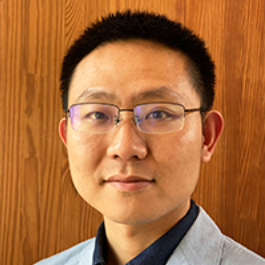Plantae Presents – Climate Extremes and Plant Sciences: Balancing Innovation with Environmental Stewardship
Plantae Presents – Climate Extremes and Plant Sciences: Balancing Innovation with Environmental Stewardship
Featuring Li Yan, Gaurav Zinta, Justin G. A. Whitehill and Jesse Lasky
When: January 21, 2025, at
9:00 AM Beijing | 1:00 AM GMT | 6:30 AM IST | 8:00 PM EST (on 01/20)
About this Webinar
Climate extremes such as heatwaves, droughts, and unpredictable weather patterns are profoundly impacting ecosystems and agriculture, creating both challenges and opportunities for plant science. This webinar explores innovative strategies and cutting-edge research driving solutions for enhancing plant resilience, productivity, and environmental sustainability. Join us as we discuss balancing technological advancements with environmental stewardship to address the urgent global challenges posed by climate change.
Hosted by the 2025 Plantae Fellows.
SPEAKERS

Li Yan
Dr. Li Yan is a research associate in Plant Science at the University of Western Australia, Perth, Australia, and serves as an editor for the journal Plant-Environment Interactions (Wiley). He obtained his PhD in Ecology from Guangxi University in 2019. Dr. Yan’s research focuses on elucidating plant-soil-microbe interactions, particularly plant responses to diverse environmental conditions, crop productivity, invasion success, and biodiversity dynamics. His work integrates extensive field investigations with controlled greenhouse studies. Additionally, he founded and manages the academic social media platform “Plant Physiological Ecology,” which aims to enhance public understanding of plant science, ecology, and critical environmental issues in our rapidly changing world.

Gaurav Zinta
Dr. Gaurav Zinta is currently working as a Senior Scientist in the Biotechnology Division at CSIR-Institute of Himalayan Bioresource Technology, Palampur, Himachal Pradesh. Also, he is a Assitant Prof. in the AcSIR. In 2010, Dr. Zinta availed a international fellowship to pursue his Ph.D. (2010-2014) from the University of Antwerp, Belgium. In August 2015, he received a PostDoc Fellowship from the Chinese Academy of Sciences (CAS) to work at the Shanghai Center for Plant Stress Biology, Center of Excellence in Molecular Plant Sciences, CAS, China. The key areas of his research interest include plant stress physiology, climate change biology, genome editing, epigenetics, and chemical genetics. The long-term goal of his research is to contribute to global nutrition and food security by bringing stress tolerant and nutritionally rich crops forward. Dr. Zinta’s lab works on crops grown in the Himalayan region (e.g., quinoa, amaranth, and potato) and also works to answer fundamental research questions by using the model plant Arabidopsis thaliana. So far, Dr. Zinta has published more than 45 peer-reviewed articles and three book chapters in top-notch scientific journals, including Nature Communications, PNAS, Global Change Biology, Journal of Experimental Botany, New Phytologist, Journal of Hazardous Materials, Biotechnology Advances, Trends in Plant Science, and Plant Cell & Environment. Dr. Zinta participates in several science outreach programs. He was selected as a 2019 ASPB Plantae Fellow and 2019 eLife Ambassador to communicate science to a broader audience. Dr. Zinta was awarded the Himalayan Phytopathological Society’s 2022 Young Scientist Award. Find him on X: @PlantAdaptOme.
 Justin G. A. Whitehill
Justin G. A. Whitehill
Dr. Justin G. A. Whitehill is an Assistant Professor in the Department of Forestry and Environmental Resources at North Carolina State University. He leads the Christmas Tree Genetics program at NCSU and co-Directs the Forest Biotechnology Group. He and his team are working to develop pest and pathogen resilient Fraser fir (Abies fraseri) Christmas trees through genetic and genomic approaches. He also holds an appointment in the Genetics Faculty at NCSU. Dr. Whitehill’s research lab at NC State consists of three graduate students, two postdoctoral fellows, one lab manager, and many undergraduate research assistants. His lab had three new members join in summer 2024. Ongoing research projects in the Whitehill lab focus on integrating traditional genetic improvement methods with advanced genomic sequencing technologies to accelerate tree breeding programs. His team is tackling the most pressing issues facing Christmas tree production in North Carolina and around the US including mortality induced by Phytophthora root rot disease, elongate hemlock scale, and browsing deer. Additionally, tissue culture techniques for elite Christmas tree germplasm are being developed to evaluate gene function and provide improved genetics more quickly to Christmas tree growers. The ultimate goal is to accelerate genetic improvement efforts of conifers to meet the cascading challenges caused by a changing climate. Find him on X: @WhitehillJustin.
 Jesse Lasky
Jesse Lasky
Dr. Jesse Lasky is an Associate Professor in the Department of Biology at Penn State University, where he also serves as Director of the PAC Herbarium. Since joining the faculty in 2015, Dr. Lasky’s lab has focused on understanding how plants adapt to their environments. Their research integrates genetics, physiology, ecology, and evolution, with sorghum and Arabidopsis serving as primary model systems. Prior to his position at Penn State, Dr. Lasky completed a postdoctoral fellowship at Columbia University and earned his PhD from the University of Texas at Austin. Find him on X: @LaskyJR.
MODERATORS

Yuanyuan Liu
Dr. Yuanyuan Liu’s academic journey began at the University of British Columbia and now she is a Professor at Fujian Agriculture and Forestry University (FAFU), where she leads a research group focused on engineering plant metabolic pathways to produce valuable compounds for human and plant health. Utilizing cannabis as a model system, her team employs a wide range of techniques from biochemistry through molecular biology to multi-omics analyses, coupled with deep learning-based modeling. Prior to joining FAFU, Dr. Liu conducted postdoctoral research in the cannabis industry as a MITACS fellow. Her research at FAFU spans three key areas: (1) optimizing plant metabolic pathways for the production of high-value compounds, including the development of plant-based platforms for bioactive compound production; (2) investigating the complex interplay between plants and their environment, examining how abiotic and biotic factors influence plant metabolism and stress responses; and (3) exploring the relationship between plant metabolism and development, focusing on how specialized tissues develop and coordinate with the production of specialized metabolites. Find her on X: @YuanyuanLiu12.
 Hao Chen
Hao Chen
Dr. Hao Chen, an Assistant Professor at Auburn University, earned his PhD in Forestry from North Carolina State University in 2017, following an M.S. from the same institution in 2014. He subsequently completed postdoctoral training at North Carolina State University, where he further honed his expertise in plant molecular biology, genetics, and bioinformatics. Dr. Chen specializes in molecular, biochemical, genetic, and genomic research, with extensive expertise in integrating omics data to model plant processes, particularly the transcriptional regulation of wood formation. His research focuses on the genetic regulation of wood cell wall biosynthesis using a systematic approach that combines genetics/genomics, biotechnology, and bioinformatics. His work aims to understand how alterations in wood cell wall components influence plant growth, resilience, and the production of high-value wood products. Through his research, Dr. Chen seeks to identify target genes for genetic modification, advancing the development of forest trees optimized for cellulose-based biofuels and enhanced environmental resilience through gene-editing technologies. His postdoctoral experience has further deepened his understanding of these complex processes, enabling innovative solutions to pressing challenges in forestry and bioenergy.

Rajarshi Sanyal
Rajarshi Sanyal is a PhD Scholar at the National Institute of Plant Genome Research in India. Recognized as a Plantae Fellow in 2023 and subsequently assuming the role of Plantae Editor, Rajarshi has demonstrated his commitment to advancing plant science. His current research explores the intricacies of plant development in response to environmental signals, with a specific focus on optimizing developmental features for enhanced photosynthesis in crop plants. Beyond the laboratory, he also shares a passion for traveling, sports, and photography. Find him on X: @rajarshi_sanyal.



